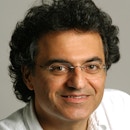Testing “Quantumness”
- Speaker
-
 Umesh Vazirani, Ph.D.Roger A. Strauch Professor of Electrical Engineering and Computer Sciences
Umesh Vazirani, Ph.D.Roger A. Strauch Professor of Electrical Engineering and Computer Sciences
Co-director, Berkeley Quantum Computation Center, University of California, Berkeley
Presidential Lectures are a series of free public colloquia spotlighting groundbreaking research across four themes: neuroscience and autism science, physics, biology, and mathematics and computer science. These curated, high-level scientific talks feature leading scientists and mathematicians and are designed to foster discussion and drive discovery within the New York City research community. We invite those interested in these topics to join us for this weekly lecture series.
How can a classical observer (such as a computer) determine that the system with which it is interacting is “truly quantum?”
In this talk, Umesh Vazirani will describe how early results in quantum computation made answering this question precise. He’ll then discuss how the question relates to our understanding of recent ‘quantum supremacy’ experiments in which quantum computers attempt to tackle problems that would overwhelm conventional computers. He will also describe how concepts from cryptography have provided novel and counter-intuitive ways of probing quantum systems and the prospects they hold for the next generation of quantum computers taking on the quantum supremacy challenge.
